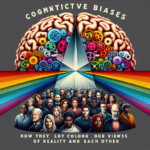
Inside the Mind of a Criminal: Understanding Psychological Triggers and Patterns

Criminal behaviour is a complex phenomenon influenced by numerous psychological, social, and biological factors. Understanding the triggers and patterns that drive such actions is essential for crime prevention and shaping rehabilitation strategies. This article explores the depths of criminal psychology, referencing insights from research and case studies to unravel the mysteries behind criminal minds.
What Drives Criminal Behaviour: Inside the Mind of a Criminal
Biological Influences
Biological factors play a significant role in shaping a person’s propensity for criminal behavior. Genetics, hormonal imbalances, and neurological abnormalities can predispose individuals to aggression and impulsivity. For instance, studies show a connection between brain injuries and an increased risk of violent behaviour.
Environmental Factors Inside the Mind of a Criminal
Environmental conditions often set the stage for criminal tendencies. Poverty, exposure to violence during childhood, and lack of educational opportunities are key contributors. An article on PsyForU discusses the profound impact of societal structures on psychological well-being, providing valuable insights into the environmental triggers of crime.
Psychological Triggers Behind Criminal Acts

Emotional Dysregulation
Criminal actions frequently stem from an inability to manage emotions effectively. Unresolved anger and frustration often manifest in violent outbursts or calculated offenses. Research underscores the importance of emotional regulation techniques in mitigating such risks.
The Role of Trauma
Early-life trauma significantly impacts criminal tendencies. Abuse, neglect, or exposure to traumatic events can alter brain function and foster antisocial behavior. PsyForU’s article on emotional triggers highlights how early experiences shape adult behaviour, offering parallels to criminal psychology.
Understanding Behavioral Patterns
Organized vs. Disorganized Offenders
Behavioural analysis often categorises criminals into organised and disorganised types. Organised offenders meticulously plan their crimes, leaving minimal evidence, while disorganised offenders act impulsively, often leaving a chaotic trail. Understanding these patterns helps in criminal profiling and investigation.
The Criminal’s Decision-Making Process
Criminals’ decision-making often oscillates between rational calculation and impulsivity. Factors such as perceived rewards, risks, and moral disengagement heavily influence their actions. PsyForU’s discussion of how psychological factors drive critical decisions in high-pressure situations provides an insightful comparison.
The Role of Social Psychology in Criminal Behavior
Peer Influence and Group Dynamics
Social psychology highlights the profound influence of peer groups and societal norms on criminal behavior. Joining gangs or criminal organisations often stems from a need for belonging or pressure to conform. Peer influence can escalate minor delinquencies into more serious offenses. Articles on PsyForU explore how social dynamics shape behaviours, drawing parallels to these patterns in criminal groups.
Societal Expectations and Labeling Theory
Labelling theory posits that society’s perception of individuals as “criminals” can reinforce their criminal identity. Once labelled, many offenders find it challenging to reintegrate into society, perpetuating a cycle of crime. This concept is deeply connected to societal expectations and stigmas, which PsyForU addresses in discussions on identity formation and societal roles.
Profiling Criminals: The Science Behind It

Psychological Profiling Techniques
Criminal profiling leverages psychological patterns to identify potential suspects and predict future actions. By analysing behaviours, motivations, and triggers, law enforcement agencies can create detailed offender profiles. Resources like those on PsyForU shed light on the applications of psychological principles in crime-solving.
Case Studies of Profiling Successes
Famous cases have demonstrated the effectiveness of psychological profiling. For example, the capture of notorious criminals such as the BTK Killer and Ted Bundy showcased how understanding behavioural patterns and psychological triggers can lead to breakthroughs. Profiling has limitations, but its successes underscore its value in criminal investigations.
Rehabilitation and Treatment Approaches
Cognitive Behavioral Therapy (CBT)
Cognitive behavioural therapy has emerged as a powerful tool in rehabilitating offenders. By addressing distorted thinking patterns, CBT helps individuals understand the consequences of their actions and develop healthier coping mechanisms. PsyForU highlights the importance of therapy in reducing recidivism rates.
Anger Management Programs
Unmanaged anger often underlies violent criminal acts. Anger management programs aim to teach offenders techniques to control their emotions and respond constructively to stressors. These programs are crucial in preventing the escalation of conflict into criminal behaviour.
Role of Support Systems in Rehabilitation
Successful rehabilitation often depends on strong support systems, including family, community, and institutional resources. PsyForU provides insights into the role of social support in fostering positive change and offers a blueprint for holistic rehabilitation strategies.
Ethical Concerns in Criminal Psychology
Balancing Public Safety and Individual Rights
The field of criminal psychology often navigates a fine line between safeguarding public safety and respecting individual rights. Profiling and predictive methods, while effective, can raise ethical concerns when they risk infringing on personal freedoms. PsyForU’s analysis of psychological ethics explores these dilemmas in depth, emphasising the need for balance and fairness in applying psychological insights.
Misuse of Psychological Insights
Psychological profiling and behaviour analysis, when misused, can lead to bias and discrimination. The potential for reinforcing stereotypes is a significant concern, particularly in diverse communities. Resources like PsyForU delve into the ethical use of psychological tools, advocating for objective and impartial applications.
Future of Criminal Psychology
Advances in Neuropsychology
Emerging research in neuropsychology is revolutionising the understanding of criminal behavior. Brain imaging techniques, such as functional MRI (fMRI), allow scientists to explore abnormalities associated with aggression and impulsivity. Articles on PsyForU discuss how neuroscience is reshaping psychological research and its applications in crime prevention.
Predictive Analytics and AI in Crime Prevention
Integrating artificial intelligence (AI) into criminal psychology offers groundbreaking potential. Predictive analytics can analyse vast data sets to identify patterns and forecast criminal activities. While promising, these tools also require ethical safeguards to ensure they are used responsibly and without bias, a topic thoroughly explored by PsyForU’s tech-focused analyses.
Conclusion
Understanding the psychological triggers and patterns behind criminal behaviour is critical for effective crime prevention and rehabilitation. We can gain deeper insights into what drives criminal acts by exploring factors such as emotional dysregulation, societal influences, and behavioural analysis. Coupled with advances in technology and ethical practices, the future of criminal psychology promises to reduce crime and support rehabilitation. Continued research and awareness are essential in creating a society where prevention takes precedence over punishment.
FAQs
- 1. What are common psychological triggers in criminal behaviour?
- Psychological triggers often include emotional dysregulation, trauma, and cognitive distortions, which can influence individuals to commit crimes. These factors may interact with environmental and social pressures to drive criminal actions.
- 2. How do early-life experiences shape criminal tendencies?
- Adverse childhood experiences, such as abuse, neglect, or exposure to violence, can have long-lasting effects on behavior. These experiences often lead to emotional instability and increased vulnerability to criminal influences later in life.
- 3. Can therapy effectively rehabilitate criminals?
- Yes, therapies like cognitive behavioural therapy (CBT) and anger management programs have shown success in helping individuals understand and change harmful behaviour patterns. Support systems play a critical role in reinforcing these changes.
- 4. What distinguishes an organised offender from a disorganised one?
- Organised offenders plan their crimes meticulously and are often methodical, while disorganised offenders act impulsively, leaving chaotic evidence behind. These distinctions are crucial in criminal profiling.
- 5. How is technology shaping the future of criminal psychology?
- Technologies like brain imaging and AI-driven predictive analytics are transforming criminal psychology. These advancements allow for better understanding, profiling, and even forecasting of criminal behaviours, though ethical considerations remain essential.









